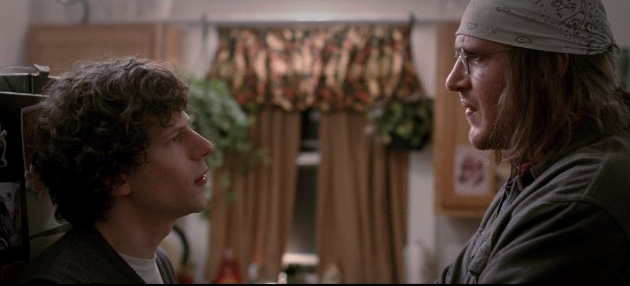Eisenberg and Segel reel us in with The End of the Tour
The End of the Tour is the kind of movie that opens with a title card, a melancholic soundtrack, and a death, so it can only end more happily than it started. David Lipsky (played by Jesse Eisenberg) gets a phone call, informing him that David Foster Wallace, the famed writer, has committed suicide. Lipsky dismisses it as a rumour, but it immediately becomes apparent that it is true. An image of Wallace (played by Jason Segel), blurry, as old memories are, flashes by. Lipsky takes out the voice recorder he had used to interview Wallace twelve years earlier, and, as he starts listening, the viewer is transported to a place where Wallace is still alive. Sometimes sound, even more so than visuals, can be a window straight into a past that continues to exist.
This past is 1996, the 1990s being a time period filmmakers are now getting increasingly interested in. Lipsky is then a 30-year-old journalist for Rolling Stone magazine. ”Do you know how many writers we have interviewed in the last ten years?” he asks his editor. The answer is zero, seemingly because no one had been deemed worthy of it. Lipsky had been reading Wallace’s modern classic Infinite Jest, letting out a gasp before he even started the second page. He gets the assignment to write a profile on Wallace and travels to Illinois to interview the author and follow him on the last stops of his book tour. The rest, as they say, is history.
Their relationship is not an easy one. Wallace comes across as easy-going and warm, but ask him something a bit more personal, and he shuts down like a clam. Wallace is very aware that Lipsky, as friendly as he tries to be, has his own agenda, and may want to twist the article in whatever direction he chooses. Besides, Lipsky is himself a budding writer, and there is a sense of rivalry between them, which expresses itself as male insecurity when Wallace talks to Lipsky’s wife on the phone—”She likes your writing better than mine!”—or when Lipsky tries to interview the author’s old flame, and Wallace panics, thinking that Lipsky may be trying to flirt with her.

They have conversations everywhere, all the time, about anything. Sometimes they talk about Wallace’s love of dogs. Sometimes Wallace asks the questions. Mostly you get the sense that Wallace, even in his good days, even at the height of his fame, suffers from extreme loneliness. He communicates through his books, and that’s the only way he seems to meet people anymore. Mostly, the film is a series of dialogues in which it is not information, but emotion that is exchanged. Jason Segel gives his character a real presence, and he doesn’t need to share deeply philosophical thoughts to sound, and look, quite meaningful. He knows how to talk, but he still comes across as quiet, because it always feels as if he has so much more to say.
This isn’t an uplifting story, but nor is it intensely dramatic. It’s not a biopic either, relying on real interviews and Lipsky’s 2010 book, but following a precise narrative compiled by screenwriter Donald Margulies. It covers a middle ground, repressing its drama just like Wallace keeps quiet about sides of himself he doesn’t want to be known. The actors do some of their best work, channeling their real-life counterparts, but also creating distinctly striking characters of their own in the process. The camera is almost always positioned as if you were present in the scene, looking over someone’s shoulder, eavesdropping in the street, listening from the back-seat of a car. You don’t need to be part of the conversation to enjoy it—listening to these characters is plenty enough.



